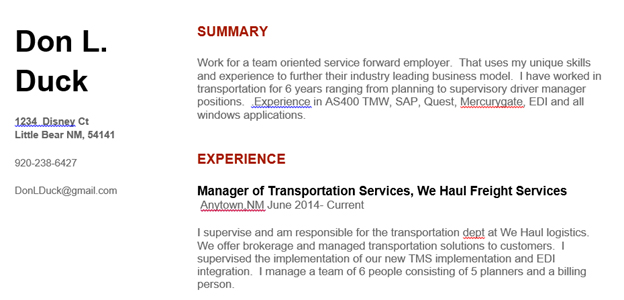LET US REMAIN VIGILANT
As I contemplate the directions to take this blog, all I can start with is WOW!
Peter Nugent, the founder and co-owner of Enlighten Financial, recently reviewed the resume of a candidate applying for a position at an organization for which Peter is a board member. This resume quickly rose to the top, not because of the stellar qualifications of the applicant but because of the abhorrent realization this resume may reflect the writing skills of recent graduates and young professionals. It is even more astounding that this person is applying for a professional position.
Please note, I do not paint all young professionals with the same broad strokes. I believe our schools and universities are providing opportunities to prepare those who choose to learn and develop their communication skills. Writing is a craft and an art. Effective writing and communication take time and effort to perfect.
The advent of technology and the power of a smartphone hold a position of responsibility for the decline of our ability to clearly and effectively communicate in a professional environment. Young people have grown up with this technology at their fingertips. It is normal for them to communicate by text, Twitter, Instagram, Snapchat, Vine, etc. These mediums do not require a formalized writing style because they are intended to communicate informal, brief messages through words, pictures, videos and emojis. There is absolutely a time and place for this style of communication. It is imperative to have the ability to use the English language to clearly, concisely and effectively communicate information in a professional context. It seems the latter may be losing out.
In a recent article for Inc. magazine, “Study: Poor Writing Skills Are Costing Businesses Billions,” Kaleigh Moore writes, “blue chip businesses are spending as much as $3.1 billion on remedial writing training — annually. Of this budget, $2.9 billion was spent on current employees —not new hires.”
I provide Exhibit A of my case, the resume of Don L. Duck. The resume has been redacted; however, only names and locations have been changed to protect the innocent and the guilty. The grammar, punctuation and  word usage are all provided by Don L. Duck.
word usage are all provided by Don L. Duck.
Word-processing software includes the benefit of spellcheck, which underlines words, phrases and punctuation for potential spelling and typographical errors. This feature is intended to draw the author’s attention to the words and phrases that may need to be revised. Don L. Duck’s thoughts must have been on a big signing bonus to not notice the rainbow of colors highlighting his resume. Periods, commas and spacing appear to be the culprits in this snippet. It should be noted these errors were not buried deep into Page 2, but were at the top of Page 1. Thanks to the digital format this resume was received, all the errors were identified for the reader. In addition, the first two sentences in the summary do not make sense as separate sentences. When combined with proper punctuation and verb tense, the sentence reads more clearly. The first impression formed by the reader was most likely not the impression Mr. Duck was looking to make.
 After a sip of water to clear the taste of vomit that came up in my throat, I continued to read this resume, now more for entertainment purposes than to determine if Don L. Duck is a qualified candidate. It seems Mr. Duck is still employed with what appears to be a previous employer. This summary starts with “I supervise…” — the current verb tense. If this were actually a previous employer, I think Mr. Duck would have elected to use the past tense of “supervise,” which is “supervised.” Additionally, the clarity of his summary left me wondering what “hiring discipline pay and reviews” really is. Mr. Duck did not create an effective summary to clearly communicate all of the fantastic things he was responsible for and accomplished with this employer.
After a sip of water to clear the taste of vomit that came up in my throat, I continued to read this resume, now more for entertainment purposes than to determine if Don L. Duck is a qualified candidate. It seems Mr. Duck is still employed with what appears to be a previous employer. This summary starts with “I supervise…” — the current verb tense. If this were actually a previous employer, I think Mr. Duck would have elected to use the past tense of “supervise,” which is “supervised.” Additionally, the clarity of his summary left me wondering what “hiring discipline pay and reviews” really is. Mr. Duck did not create an effective summary to clearly communicate all of the fantastic things he was responsible for and accomplished with this employer.
My fascination with this resume, similar to that of watching a train wreck, grew as I continued to read about Mr. Duck. I just couldn’t help myself. Mr. Duck lists his first and probably most important skill as “Supervisory 40 direct reports.” I imagine what Mr. Duck intended to say was that he previously supervised 40 people who directly reported to him. Mr. Duck failed to appropriately convey the significance of his most important skill.

If Mr. Duck provided this document as a sample of his attention to detail, writing skills and a best reflection of his abilities, can you imagine what he may deem to be appropriate as your employee?
According to the Inc. magazine article, “One of the first places poor writing skills can be spotted is within the resume and cover letter. For those who make the cut, some employers are asking potential hires to complete a writing exercise during the interview process to evaluate writing skills before an offer is made.”
“Employers are already being proactive about weeding out poor writers from the hiring process. The College Board data showed that 50 percent of respondents take writing into consideration when hiring professional staff and 80 percent of corporations with employment growth potential assess writing during hiring.”
This blog is not intended to critique resume writing and formatting styles. Its purpose is to create awareness of the potential lack of fundamental writing skills to communicate to a specific audience in a clear, concise and well-organized manner. Mr. Duck’s writing is not all that it is “quacked” up to be. Unfortunately for Mr. Duck, his resume was not taken very seriously.
Commercial banking demands communication that is clear, concise and effective in providing critical information. An effectively written credit presentation is one of the most consistent shortcomings we encounter in our world of commercial loan review and credit underwriting. It is vital credit analysts have the ability to tell a powerful and persuasive story and interpret key analysis to provide a well-thought-out narrative for senior management, members of the loan committee and members of the board. Customer service may also be impacted in providing a timely response to a potential customer should a credit presentation be sent back for revisions or clarifications. Third parties such as examiners, auditors and loan reviewers also read credit presentations and will pass judgment on the quality of the analysis based on the quality of the writing in the credit presentation.
It is imperative a credit presentation succinctly identify and summarize risk. Lengthy credit presentations may contain a great deal of data, but may not clearly provide the necessary insight regarding critical factors to make a well-informed business decision based on facts. Underwriters and loan officers may possess strong sales, credit and analytical skills, but may lag in their ability to appropriately communicate their analysis in a clear and concise manner.
The limitations of writing logically, with purpose and precision will go well beyond the walls of the financial institution. These same employees are communicating in various forms with customers and prospects. Ultimately your employees convey insight into the culture of what is appropriate and acceptable within your organization and the quality of your employees. How do you want your organization to be perceived in the market?

Comments are closed here.